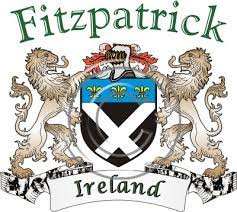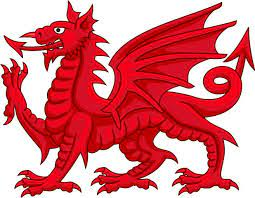Sunday, April 02, 2023
Robinson Genealogy in Wales But DNA Shows Ireland
Nadene Goldfoot
Much to my surprise, my grandfather told me when very young that his people had come from Wales. Genealogy shows England like so many other Robinsons living in New England show that they also came from England. New England was crawling with Robinsons.
The most important DNA test of my male cousin shows that we are connected to the FitzPatrick Irish of Ireland. They were the first to discover our connection by the Y haplogroup test.
Our geography means that Ireland and Wales share a common maritime story. The Irish Sea, the narrow strip of water which connects rather than divides us, has been traversed by our peoples over millennia.
The Irish Sea was formed in the Neogene era. Notable crossings include several invasions from Britain. The Norman invasion of Ireland took place in stages during the late 12th century from Porthclais near St. Davids, Wales, in Hulks, Snekkars, Keels and Cogs to Wexford Harbour, Leinster. The Tudors crossed the Irish Sea to invade in 1529 in caravels and carracks. In 1690 the English fleet set sail for the Williamite War in Ireland from Hoylake, Wirral, the departure becoming permanently known as King's Gap as a result.
Figures from Ireland's 2016 Census show that 1.7 per cent of the population speak Irish Gaelic every day. In Wales, it's 16.3 per cent of the population speaking Welsh every day. While both languages originate from the same source, the written and spoken forms are different. The languages that we refer to today as being of Celtic origin are Irish Gaelic, Scottish Gaelic,
Known also as Irish Gaelic or Gaeilge. (In the past and still very occasionally can be called Erse) Number of Native Speakers: 40-80,000 Everybody attending school in Ireland learns Irish and many profess to speaking the language according to the National Census. Irish is the first official language of the country but the working language for most things is English. Although, the government supports the language in many ways and introduced a Language Act in 2003 to increase the level of public services in Irish, the biggest success in the revival of the gaelic language is the growth of gaelscoileanna which immerse kids in the language and the success and popularity of the TV channel TG4.
Welsh is also known as Cymraeg or y Gymraeg Approx 600,000 speakers: Welsh is the Celtic language with in the healthiest state. In Wales there has been a real and quite successful effort to restore the language. The number of speakers is actually increasing. Both the teaching of the language to all children under the age of 16 and the popularity of Welsh media channels have helped reverse the decline. The Welsh Language Act of 1993 also ensures that the public can avail of services in English or Welsh.
Norman Invasion of Ireland:
Anglo-Normans gradually conquered and acquired large swathes of land from the Irish, over which the kings of England then claimed sovereignty, all allegedly sanctioned by the Papal bull Laudabiliter. At the time, Gaelic Ireland was made up of several kingdoms, with a High King claiming lordship over most of the other kings. The Norman invasion was a watershed in Ireland's history, marking the beginning of more than 800 years of direct English and, later, British, involvement in Ireland.
In May 1169, Anglo-Norman mercenaries landed in Ireland at the request of Diarmait mac Murchada (Dermot MacMurragh), the deposed King of Leinster, who sought their help in regaining his kingship. They achieved this within weeks and raided neighbouring kingdoms. This military intervention was sanctioned by King Henry II of England. In return, Diarmait had sworn loyalty to Henry and promised land to the Normans
The Irish used to raid the west coast of Britain and carry off slaves. They may even have tried a few attempts at colonisation. This would have brought them into conflict with the Welsh (of course this is before either Wales or Ireland were united countries).
The Normans conquered England then conquered Wales. Later they would conquer Ireland as well. That particular conquest is usually erroneously attributed to the English but was led by Normans from Wales.In many ways, the famous Battle of Hastings in 1066 was just the beginning for the Normans, with many challenges awaiting them in the British Isles. In order to secure the Welsh border, William the Conqueror (recently crowned as King of England) established loyal Norman nobles in strongly garrisoned Earldoms along the frontier. What followed was decades of warfare and diplomacy as these "Marcher Lords" sought to extend their domains by subjugating the stubbornly independent Welsh.
Of course they were not Welsh as such but Welshmen would have been among the soldiers that invaded Ireland.
Similarly pretty much every time British armies went over to Ireland, there would have been Welshmen among the armies.But there has never been a war between Wales and Ireland. Wales only briefly existed as a unified state before being conquered by the Normans; thereafter it was part of England or Britain. Similarly, there was never a state called ‘Ireland’ before the Normans got there.
Llywelyn the Great, the Welsh PrinceWales had been in complete disarray. In August 1063, Gruffudd ap Llywelyn was killed by his own men; his head and the figure-head of his ship were dispatched to Harold Godwinson and so, eventually, to Edward the Confessor, as the trophies of a signal victory. Within Wales itself, his death left a vacuum of authority and power. His hegemony had been founded on military might and personal dependence; it had no institutional base that could outlast his own downfall. The natural fissiparousness of Welsh ‘political’ life — if such a genteel term may be used for the litany of family and inter-dynastic conflicts, raids, kidnappings, and murders — now reasserted itself. Puppet rulers, political exiles, and adventurers competed desperately with each other and joined forces in a perplexing kaleidoscope of temporary alliances to further their ambitions. Rarely, even by its own standards, was the Welsh ‘political’ scene more fluid, its allegiances more brittle and its supremacies more short-lived than in the later eleventh century. They were ripe to be plucked by England.
President of Ireland, Mary Robinson, married to a Robinson: In 1970, she married Nicholas Robinson, with whom she had a relationship since they were law students and who was then practising as a solicitor. Together they have three children. Nicholas Kenneth Robinson (born 9 February 1946) is an Irish author, historian, solicitor and cartoonist who is the husband of the 7th President of Ireland and former United Nations High Commissioner for Human Rights, Mary Robinson.
My male cousin's father's name was Edward Kenneth Robinson.
My male cousin is Kenneth Arthur Robinson b: 1946.
My son was born on 9 February 1953.
It's an interesting beginning.
Robinson was born in Amsterdam, Netherlands, in 1946, to a wealthy middle-class Anglican family. He was born to Howard Robinson and Lucy Robinson , the third in a family of four boys. His father was an accountant who founded the City of Dublin Banker and was a prominent freemason of the Grand Lodge of Ireland. The Robinson family had been coopers associated with the brewing business of the Guinness family. Nicholas's grandfather was a coal importer.
I have a big problem with President Mary Robinson.
She does not back Israel. She votes against Israel while I'm holding dual citizenship and am a strong
advocator for Israel, writing in defense every day. At least I'm
not related to her, but possibly her husband.
Robinson served as the twenty-fourth, and first female, chancellor of the University of Dublin. She represented the university in the Seanad for over twenty years and held the Reid Chair in Law. She was succeeded as chancellor by Mary McAleese, who had also succeeded her as president of Ireland. Was her husband, by any chance, from the Fitzpatricks?
My father, known as Billy Meshke, the boxer at South Portland's Neighborhood House, was tough; selling newspapers at age 4 in the city being his father was killed.The oddest fact is that my grandfather, Jewish with ancestry from Lithuania, moved to Dublin after visiting England. From there he was on a ship to Canada and then wound up in Idaho marrying my grandmother/Bubby, also a Litvak. Quite a few Goldfoots/Goldfus were living in Dublin. As coincidences happen, he chose the same business as my Robinson grandfather in Portland, knew each other, that business was of having a wagon with horses and going to the docks and delivering boxes to people and businesses. The difference was that Robinson was from a farm and handled 4 horses easily with his wagon, while Goldfoot with one horse couldn't do it, and the horse was soon startled, threw him out of the wagon, head was hit and he died in hospital.
My connection of Robinson to the Norman invasion of Ireland seems like the time element such a connection took place. It goes way back. In the meantime, my Robinson ancestors have tried to make their way known to me through genealogy.
… (more).
Labels: England, Fitzpatrick, New England, Vermont, Wales









